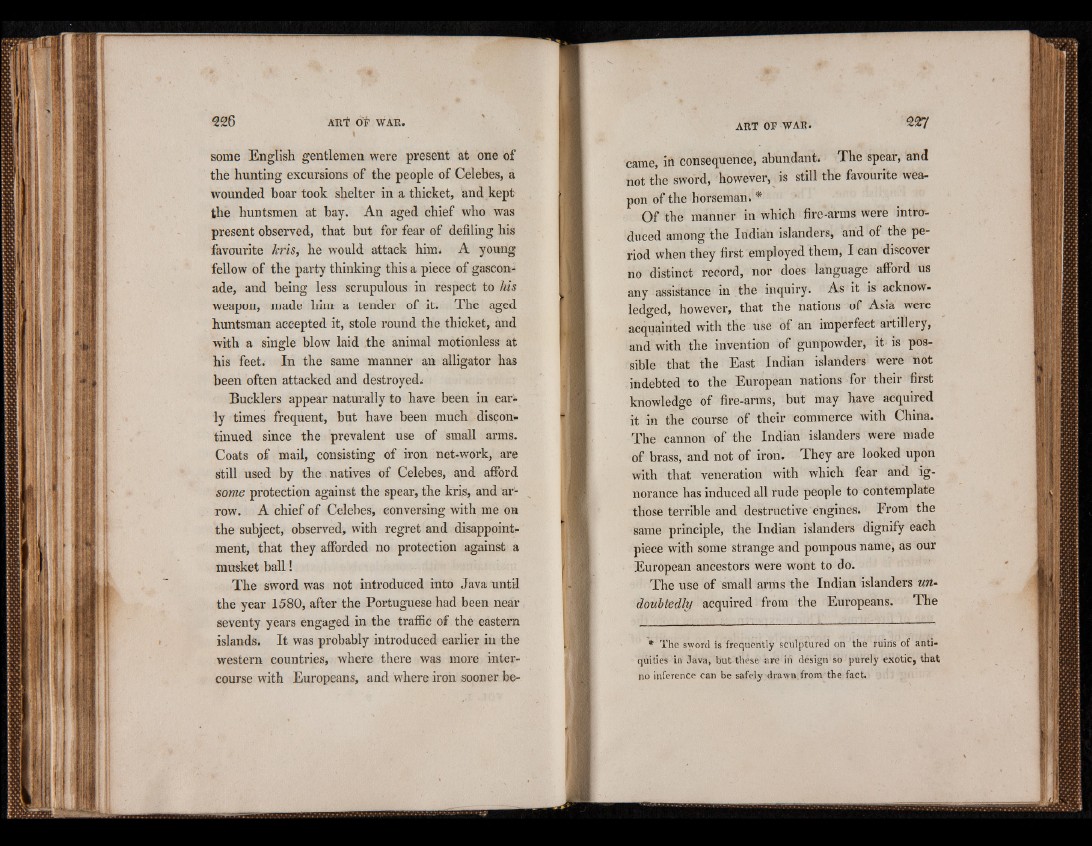
226 ARf OF WAR.
' *
some English gentlemen were present at one of
the hunting excursions of the people of Celebes, a
wounded boar took shelter in a thicket, and kept
the huntsmen at bay. An aged chief who was
present observed, that but for fear of defiling his
favourite kris, he would attack him. A young
fellow of the party thinking this a piece of gasconade,
and being less scrupulous in respect to his
weapon, made him a tender of it. The aged
huntsman accepted it, stole round the thicket, and
with a single blow laid the animal motionless at
his feet; In the same manner an alligator has
been often attacked and destroyed.
Bucklers appear naturally to have been in early
times frequent, but have been much discontinued
since the prevalent use of small arms.
Coats of mail, consisting of iron net-work, are
still used by the natives of Celebes, and afford
some protection against the spear, the kris, and arrow.
A chief of Celebes, conversing with me on
the subject, observed, with regret and disappointment,
that they afforded no protection against a
musket ball!
The sword was not introduced into Java until
the year 1580, after the Portuguese had been near
seventy years engaged in the traffic of the eastern
islands. It was probably introduced earlier in the
western countries, where there was more intercourse
with Europeans, and where iron sooner became,
in consequence, abundant. The spear, and
not the sword, however, is still the favourite weapon
of the horseman. *
Of the manner in which fire-arms were introduced
among the Indian islanders, and of the period
when they first employed them, I can discover
no distinct record, nor does language afford us
any assistance in the inquiry. As it is acknowledged,
however, that the nations of Asia were
acquainted with the use of an imperfect artillery,
and with the invention of gunpowder, it is possible
that the East Indian islanders were not
indebted to the European nations for their first
knowledge of fire-arms, but may have acquired
it in the course of their commerce with China.
The cannon of the Indian islanders were made
of brass, and not of iron. They are looked upon
with that veneration with which fear and. ignorance
has induced all rude people to contemplate
those terrible and destructive engines. From the
same principle, the Indian islanders dignify each
piece with some strange and pompous name, as our
European ancestors were wont to do.
The use of small arms the Indian islanders undoubtedly
acquired from the Europeans. The
* The sword is frequently sculptured on thé ruins of antiquities
in Java, but these are in design so purely exotic, that
no inference can be safely drawn, from the fact.